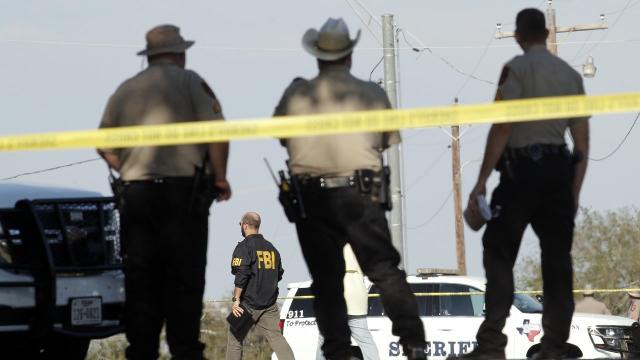When is it terrorism? When is it a hate crime?

Texas authorities said Monday that it is not investigating the Sutherland Springs, Texas, church shooting as terrorism after more than two dozen were killed Sunday. But the New York City truck attack that killed eight people just a few days earlier was called an act of terror almost immediately. Why the difference?
Let's start by looking at definitions:
- The FBI defines domestic terrorism as "perpetrated by individuals and/or groups inspired by or associated with primarily U.S.-based movements that espouse extremist ideologies of a political, religious, social, racial or environmental nature."
- Title 22 of the U.S. Code defines terrorism as "premeditated, politically motivated violence perpetrated against non-combatant targets by subnational groups or clandestine agents."
- Merriam-Webster defines terrorism as the "systematic use of terror especially as a means of coercion."
These definitions of terrorism require that death and violence are not the only aim, but that there also be a political or ideological motive.
"Where a lot of scholars tend to agree is that it's some sort of politically motivated violence against non-combatants with the intention of causing societal fear," said Fait Muedini, international studies professor at Butler University in Indianapolis.
In the case of the NYC attack, the suspect left a note pledging allegiance to the Islamic State, police said; federal prosecutors said he planned the attack for a year as he drifted into a violent radical ideology.
Though the motive is not precisely known in the First Baptist Church shooting, the gunman had a history of domestic abuse against his wife and child, and his mother-in-law attended the church.
However, in both cases, many on social media focused on the race and religion of the suspects. It was another example of how "terrorism" is no longer simply a legal definition, but an increasingly politicized one.
"Many people don't understand the nuances of the definition of terrorism, and ever since 9/11 ... it's been highly politicized," Muedini said. It happens on both sides — for instance, people on the left politicizing events as it pertains to gun control, and those on the right pushing "anti-immigrant positions, Islamophobia," Muedini said.
President Trump, for instance, proposed changes to immigrant vetting and visas within hours of the New York attack but hasn't suggested any government response to the Las Vegas shooting that killed 58 (in which Stephen Paddock's motive remains under investigation). President Obama also used the word "terrorism" to describe some mass casualty events that happened during his administration, such as the Pulse nightclub shooting in Orlando.
When is it a hate crime?
On the other side of the political spectrum are those asking why the Texas church shooting has not been labeled a hate crime.
Targeting a group of people for their religious beliefs would likely meet the definition, but the Texas attack "wasn't over religious beliefs," said Texas Department of Public Safety official Freeman Martin.
The Department of Justice says hate crimes "include acts of physical harm and specific criminal threats motivated by animus based on race, color, national origin, religion, gender, sexual orientation, gender identity or disability." It adds:
Hate crimes have a devastating effect beyond the harm inflicted on any one victim. They reverberate through families, communities, and the entire nation, as others fear that they too could be threatened, attacked, or forced from their homes, because of what they look like, who they are, where they worship, whom they love, or whether they have a disability.
Dylann Roof, the self-identified white supremacist who in 2015 killed nine black parishioners at Charleston's Emanuel African Methodist Episcopal Church was found guilty of both federal hate crimes and obstruction of religion.
Pushing agendas and rushing judgments
Though the definition of terrorism is largely agreed upon by scholars, the government and mainstream media, the problem is that many "aren't using the same criteria" when applying it, Muedini said.
"There are many ways we can think about the definition, but what we see is a bias by many in government" and media, Muedini said. "They're not using a consistent standard, (and) some are trying to control narratives."
This is perhaps even more true on social media where armchair commentators make assertions about an attacker's identity and motives often before authorities have even announced a name.
"On social media, people are trying to shape the narrative in a way that isn't helpful because they don't have all the information. So I think it's important to stress throughout the country that we want to make sure these things don't happen, that we give law enforcement the support and time to investigate these crimes and that we do not make snap judgments," Muedini said.
"We are living in an age where trust in media that has put in the work and has done due diligence is less valued in society compared to" media that aligns with people's views, he said.
The semantics around these tragedies have become politicized, but they shouldn't be, Muedini said.
"This is not a partisan issue. It's quite bipartisan. We as Americans want to stop these things from happening because they're horrific. We shouldn't be trying to score political points. ... We should think about solving the problem rather than trying to push an agenda. We have a long way to go, unfortunately."